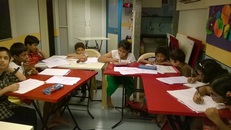|
One thing that I’ve learnt from teaching young children is that they often believe anything that is told to them, if it is put across convincingly enough, as they have such powerful imaginations. This was brought home to me clearly a few weeks ago. I was talking to students in a creative writing class, when there were a few loud knocks on a wooden door behind me. I ignored them, but a few minutes later, the knocks returned, and they were louder, and more insistent than before.
“Who’s knocking on that door?” a little girl asked me curiously. “Maybe it’s a ghost who also likes to write stories,” I replied with a laugh. I continued teaching my students, but within a few minutes, I realized that I had completely lost them. No one was paying the slightest attention to me – my students were fidgeting in their seats, and I could hear a few whispers too. “What’s going on?” I asked in surprise. “He’s afraid of the ghost that knocked on the door,” a boy volunteered, pointing at a classmate who sat trembling in his chair, and was as white as a sheet. Everyone else was staring anxiously at him, and a quick glance at the students showed that the boy’s fear was catching. A few of the other students were beginning to look decidedly nervous too. “The sound we heard was probably just the wind rattling the door,” I said loudly and emphatically, in what I thought was a convincing tone. But it was of no use – the ghost that I had so carelessly created had completely captured the attention of my students, to the exclusion of everything else. I knew that if I did not exorcise it at once, my class would be completely derailed. As my students watched, I hurried to the wooden door and threw it open. The door opened out to a dingy, dark, unused passage with a musty smell, filled with cobwebs and electric metres. As my eyes adjusted to the dim light, an unbidden thought crossed my mind – this was in fact, just the kind of place a ghost might choose to live undisturbed! However, as I firmly pushed aside the story that was trying to come to life in my mind, I noticed that some of my students who had also tip –toed to the doorway, were looking really worried. As I desperately stuck my head out of the door again, I spied a courier delivery boy cycling past the building leisurely. “There!” “I cried, pointing triumphantly at him. “That’s the person who knocked on the door. He must have had a letter to deliver to this building.” Then I wove an elaborate tale about the hapless courier boy’s incompetence, and as he faded out of sight, blissfully unaware of how he had been vilified, I shut the door quickly, and resumed my class. “When I am an old man, I will have many grand-sons.” I once read this sentence in a composition that a ten year old boy handed in to me. “Don’t you want to have any grand-daughters?” I asked the little boy. “No,” he said emphatically. “Boys are better than girls.” I put down my pen slowly, and then, gently gave him a small talk on gender equality, emphasizing how important it was for us to treat all human beings equally, regardless of their gender, race, caste or creed. The boy listened impassively. When I discussed this event later with my family members, I told them despondently that I was certain that my words would have made no impact on my little student. How wrong I was! Several weeks later, I gave the same creative writing class writing prompt, ‘if you could be a stone, what kind of stone would you be?’ Before the students started writing, we discussed the prompt orally as we usually did, to throw up ideas to inspire the little writers. I told my students that a stone could be a pebble lying in a riverbed, a piece of volcanic rock, a brick, or even a shining ruby. One boy announced that he wanted to be a lump of coal; another said he would be a piece of bright coral growing in the seabed, and a little girl said she would like to be a glittering diamond. As the class settled down to write, the little man who had earlier expressed a desire to be the proud grandfather of many grand-sons, put up his hand. He had a question for me. “Maam,” he asked me earnestly. “Can I make my stone a girl?”
1 Comment
|
AuthorArchives
November 2018
Categories |

 RSS Feed
RSS Feed
